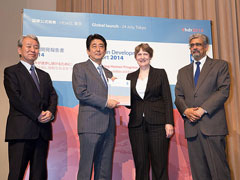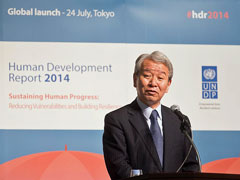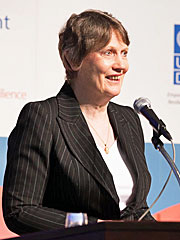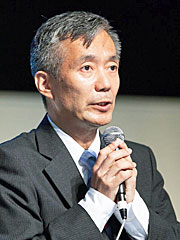The United Nations Development Programme (UNDP) has issued the report every year since 1990 to aim for the diffusion and promotion of human-centered development, and it is a report that has significant influence in the international development field. Every year it announces the Human Development Index, a summary measure of the degree of human development around the world, including developed countries, and it also includes a profound analysis of a theme that matches international trends of the time.
On July 24, the global launch of this Human Development Report 2014 was held for the first time in 18 years in Japan at the United Nations University, and over 350 people gathered, with the participation of Prime Minister Shinzo Abe, UNDP Administrator Helen Clark, Khalid Malik, director of the UNDP Human Development Report Office, and JICA President Akihiko Tanaka.

Helen Clark, administrator of the United Nations Development Programme, second from the right, hands over the Human Development Report 2014 to Prime Minister Shinzo Abe, to her left. Khalid Malik, director of the UNDP Human Development Report Office, is to her right, and JICA President Akihiko Tanaka is at left.
Japan singled out as a leader in the disaster risk reduction field
The 2014 report is entitled “Sustaining Human Progress: Reducing Vulnerabilities and Building Resilience”. As a country that has overcome repeated natural disasters and continued its effort to build a resilient society, as well as led international cooperation in the disaster risk management field, Japan was singled out as a venue for this global launch.
Human Development Report 2014 points out that, in order to further “sustain human progress ... reducing vulnerabilities and building resilience” is important. Moreover, the report examines “vulnerability” by dividing it into “structural vulnerabilities,” which are seen in groups of people who are socially excluded, and “life cycle vulnerabilities” that could happen at unstable times of some people’s life cycles. It calls for universal access to basic social services, stronger social protection and a commitment to full employment as effective measures to build a resilient society, and the importance of preparedness for crises such as natural disasters, together with improvement in recovery capacity after a crisis, and reducing the potential for conflict.
JICA’s contribution to the Human Development Report
Every year, in preparing the report, an advisory panel consisting of globally eminent scholars, politicians and development professionals provides expert advice to a production team of the Human Development Report Office.
JICA President Akihiko Tanaka, at the request of the UNDP, was appointed as a member of the advisory panel for the 2014 report, after serving in the same capacity for the 2013 report. He has been providing advice and recommendations at meetings associated with the report's creation in New York as the sole member from Japan.
Also, the JICA Research Institute co-hosted a meeting in Tokyo entitled “East Asia Consultation Meeting” with UNDP in March 2013 relating to the 2014 report. Specialists and experts in the East Asia region participated to discuss directions and important focal points for the report.

“Facing themes like vulnerability and resilience is indispensable for sustainable development,” JICA President Akihiko Tanaka emphasizes
Looking ahead to the Post Millennium Development Goals

“Japan is widely acknowledged as a global leader of disaster risk reduction and human security,” UNDP Administrator Clark says.
At the global launch this time, Prime Minister Shinzo Abe expressed Japan’s intention to continue proactive contribution for building resilience in cooperation with the international community, the UNDP and other actors. Especially, in relation to the disaster risk reduction field, which is a pillar of resilience building, he said that Japan will lead the international community by making maximum use of the knowledge and skills it has. Also, he referred to the concept of human security in building resilience, and to the importance of empowering women.
Next, Clark started by saying, “I am delighted to be launching the 2014 Human Development Report in Japan, which is acknowledged as a global leader of disaster risk reduction and human security,” and explained a brief overview of the report. She went on to congratulate Japan on its contribution in the field of disaster risk reduction, and on the fact that Japan will co-host the 3rd UN World Conference on Disaster Risk Reduction in Sendai, Miyagi, to be held in March 2015. She also said she hopes the report will contribute to the conference and other international discussion processes.
Following a presentation by Khalid Malik, director of the Human Development Report Office, Tanaka appeared as a speaker. He said that being on the ground of developing countries and in the international arena as the president of JICA, he strongly feels that facing “vulnerability” and “resilience” is indispensable for sustainable development. On that basis he pointed out that the current Millennium Development Goals are not always sufficient in perspective of attention to those people and communities that are socially vulnerable, as well as responding to such risks as conflicts and natural disasters. Based on these points, he said it is essential to have a viewpoint of preparing for conflicts and natural disasters by paying attention to the quality of growth and also to people and communities, along with a focus on equality and inclusivity of development for the post-2015 Development Agenda, .
Further, he went on to say that it perfectly matches such a viewpoint that the 2014 report explains the importance of reducing vulnerabilities and building resilient societies under a people-centered approach. Moreover, Japan has made efforts to realize the concept of human security within the international community and thus it is in the position of leading the international community with regard to the themes like vulnerability and resilience, and JICA will proactively contribute to building resilient societies, he said.
For building resilience in developing countries

JICA Research Institute Deputy Director Naohiro Kitano says collaborative work is needed to build resilient societies.
After the global launch, an open dialogue based on the 2014 report took place, in which Malik, Kazuhiko Takemoto, director of the United Nations University Institute for the Advanced Study of Sustainability (UNU-IAS), and Naohiro Kitano, deputy director of JICA Research Institute, appeared as panelists.
After being asked about his outlook on how the international community can jointly make efforts to build resilience in developing countries, Kitano touched on the signing of a Memorandum of Understanding between UN Office for the Coordination of Humanitarian Affairs and JICA on July 23 and said, “It is important that humanitarian assistance organizations and development aid agencies work together to improve the resilience of those who are prone to be in crises and are in a vulnerable situation. For that, JICA can make use of its experience in seamless assistance from emergency relief to reconstruction support.”
With supply chains globalized and natural disasters in other countries potentially affecting the Japanese economy, he also talked about JICA’s cooperation for enhanced preparedness for the risk of natural disasters in areas of clustered industry, and for developing Area Business Continuity Plan (Area BCP) in ASEAN regions where many of Japanese enterprises are present, and emphasized that “governments and the private sector need to work together to build resilient societies.”




scroll